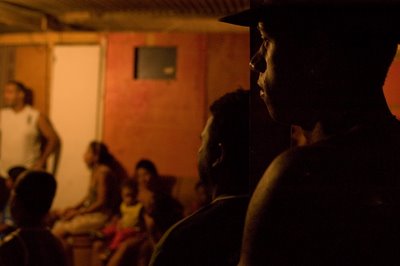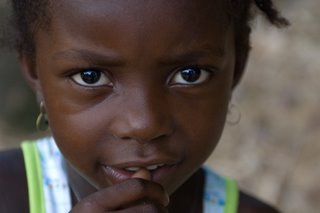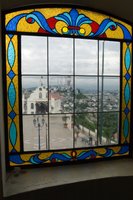As I stood on the wooden planks that made up the floor of their church, I scanned the crowd of Warao faces. Deep in the jungle of eastern Venezuela, Warao villages dot the riverbanks of the Orinoco River and the tributaries that make up the delta.
From where I stood at the front of the meeting area, several small children crouched at my feet. A crowd of women and children covered most of the floor, and I soon found myself scanning their faces, making a mental note of those who appeared malnourished and those who looked healthy.
As I glanced down at the children at my feet, a thought crossed my mind that often does on these trips. I thought, “Why wasn’t I born here? Why was I so privileged to be raised a healthy child in the United States with parents who love me, when so many children live such a harsher reality around the globe?”
It’s a question I don’t think I’ll ever fully come to grips with, but as I struggled with the thought and looked into their faces, another thought came to mind. It’s one that I’m not exactly proud to admit, but I looked at the children and felt pity for them. I thought about all the things I’ve experienced in life, and then I started to think about what they will most likely experience in theirs, and I was almost grieved at the thought.
But as the church service came to a close, a woman stepped forward. She was sharing a testimony of how the Lord had miraculously healed her. She had been cooking when an explosion burned her face and left her unconscious. Her family members debated taking her to the witch doctor—which is common to Warao culture—but instead, they took her to the church where the Warao pastor prayed over her. As he prayed, she lay unconscious, but she had a vision. She saw a man in a luminous white robe standing before her, and he brushed his hand across her face. When she awoke to find Warao believers praying over her, her face was healed.
Then I noticed a man step forward. He was holding out his hand. As the translator explained what he was saying, I realized he’d been bitten by a poisonous snake, and the Lord had miraculously healed him. Then there was the woman who had been paralyzed, and I watched her walk.
But it didn’t end there. We got back in the boat and traveled a little further up river to the next church, where I came face to face with a woman who’d been hemorrhaging for 14 years and was now healed. And then there was the woman who’d been demon-possessed for 15 years, spending her days in the river and her nights roaming the jungle. But she sat in the Warao worship service—healed.
It didn’t take long for the feelings of pity to subside. God is making himself known among the Warao, and the pity I first felt soon turned to awe at what an amazing God we serve.
From where I stood at the front of the meeting area, several small children crouched at my feet. A crowd of women and children covered most of the floor, and I soon found myself scanning their faces, making a mental note of those who appeared malnourished and those who looked healthy.
As I glanced down at the children at my feet, a thought crossed my mind that often does on these trips. I thought, “Why wasn’t I born here? Why was I so privileged to be raised a healthy child in the United States with parents who love me, when so many children live such a harsher reality around the globe?”
It’s a question I don’t think I’ll ever fully come to grips with, but as I struggled with the thought and looked into their faces, another thought came to mind. It’s one that I’m not exactly proud to admit, but I looked at the children and felt pity for them. I thought about all the things I’ve experienced in life, and then I started to think about what they will most likely experience in theirs, and I was almost grieved at the thought.
But as the church service came to a close, a woman stepped forward. She was sharing a testimony of how the Lord had miraculously healed her. She had been cooking when an explosion burned her face and left her unconscious. Her family members debated taking her to the witch doctor—which is common to Warao culture—but instead, they took her to the church where the Warao pastor prayed over her. As he prayed, she lay unconscious, but she had a vision. She saw a man in a luminous white robe standing before her, and he brushed his hand across her face. When she awoke to find Warao believers praying over her, her face was healed.
Then I noticed a man step forward. He was holding out his hand. As the translator explained what he was saying, I realized he’d been bitten by a poisonous snake, and the Lord had miraculously healed him. Then there was the woman who had been paralyzed, and I watched her walk.
But it didn’t end there. We got back in the boat and traveled a little further up river to the next church, where I came face to face with a woman who’d been hemorrhaging for 14 years and was now healed. And then there was the woman who’d been demon-possessed for 15 years, spending her days in the river and her nights roaming the jungle. But she sat in the Warao worship service—healed.
It didn’t take long for the feelings of pity to subside. God is making himself known among the Warao, and the pity I first felt soon turned to awe at what an amazing God we serve.




